Evaluating Industrial Relations Concepts: A Detailed Report
VerifiedAdded on 2023/01/10
|23
|8613
|96
Report
AI Summary
This report provides a comprehensive analysis of industrial relations within the retail sector, using Tesco as a case study. The report begins with an introduction to industrial relations, followed by a background of the organization. It then delves into four key concepts of industrial relations: power and authority, individualism and collectivism, fairness and equity, and integrity and trust. Each concept is thoroughly explained and evaluated in the context of the retail industry, with relevant examples provided. The report further examines the practical application of these concepts within the chosen organization. Finally, the report offers recommendations for improving industrial relations, and concludes with a summary of key findings. The report is structured into two main tasks, addressing the evaluation of the organization's industrial relation concepts and practices, and providing recommendations for fostering harmonious industrial relations within the organization, based on the provided assignment brief.
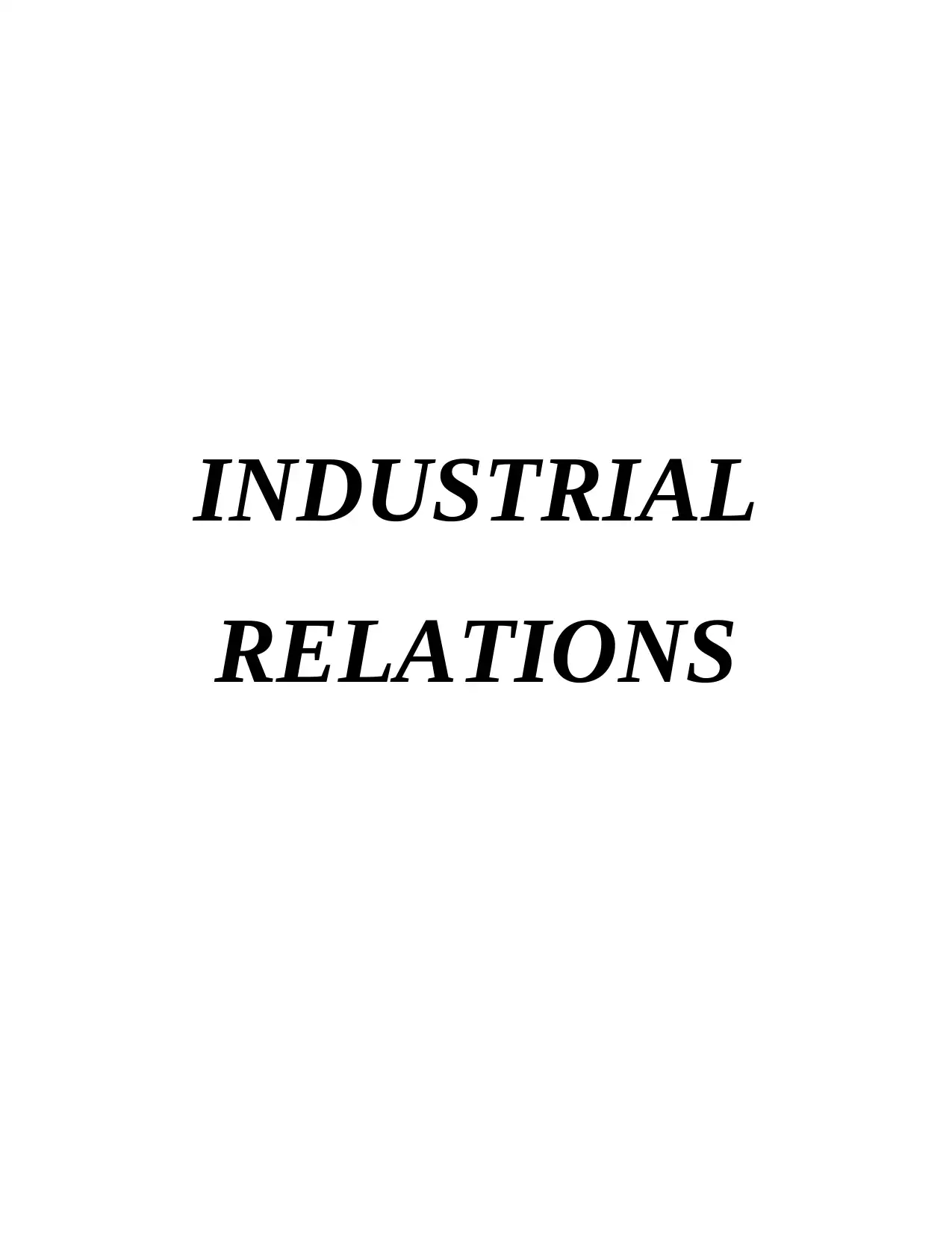
INDUSTRIAL
RELATIONS
RELATIONS
Paraphrase This Document
Need a fresh take? Get an instant paraphrase of this document with our AI Paraphraser
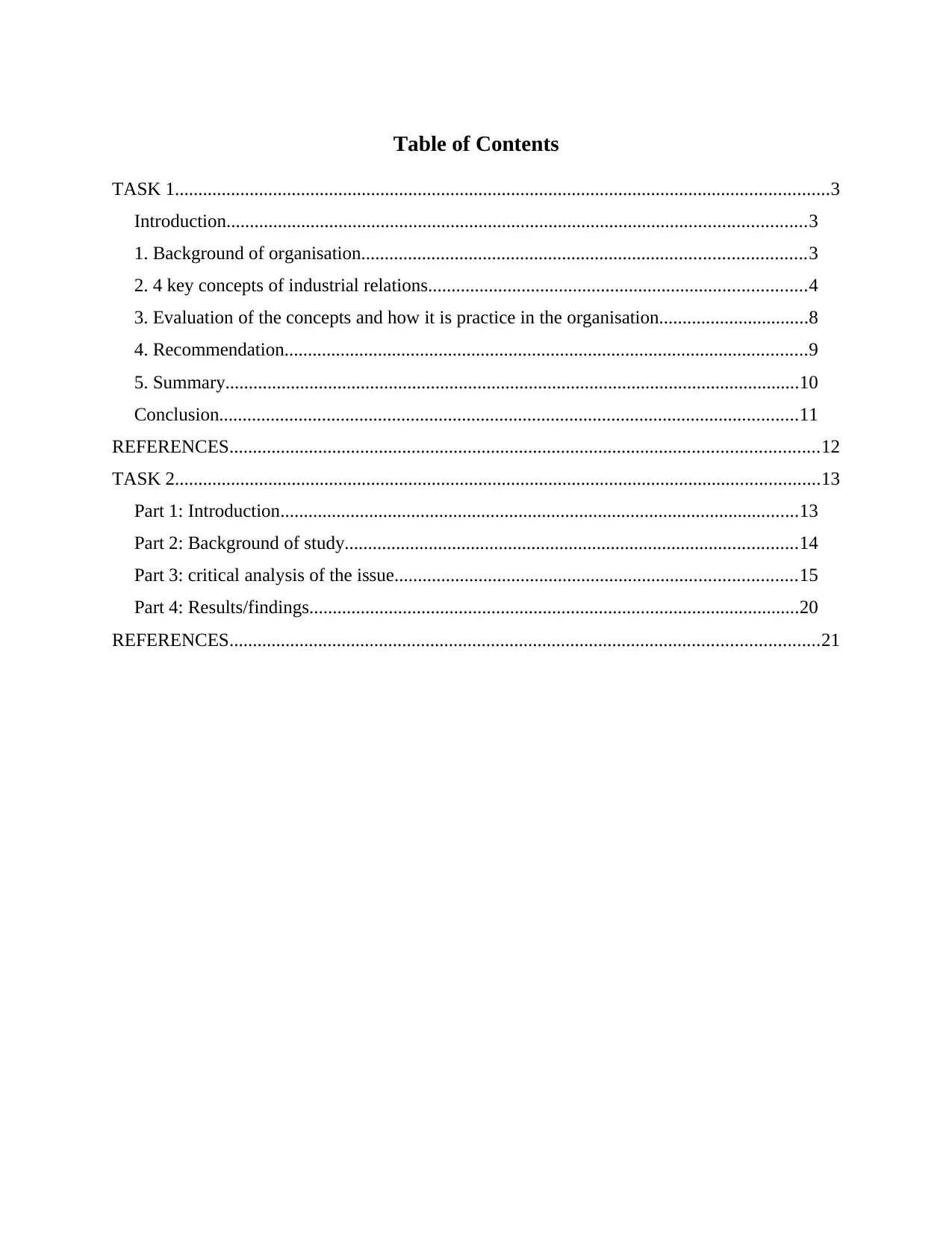
Table of Contents
TASK 1............................................................................................................................................3
Introduction............................................................................................................................3
1. Background of organisation...............................................................................................3
2. 4 key concepts of industrial relations.................................................................................4
3. Evaluation of the concepts and how it is practice in the organisation................................8
4. Recommendation................................................................................................................9
5. Summary...........................................................................................................................10
Conclusion............................................................................................................................11
REFERENCES..............................................................................................................................12
TASK 2..........................................................................................................................................13
Part 1: Introduction...............................................................................................................13
Part 2: Background of study.................................................................................................14
Part 3: critical analysis of the issue......................................................................................15
Part 4: Results/findings.........................................................................................................20
REFERENCES..............................................................................................................................21
TASK 1............................................................................................................................................3
Introduction............................................................................................................................3
1. Background of organisation...............................................................................................3
2. 4 key concepts of industrial relations.................................................................................4
3. Evaluation of the concepts and how it is practice in the organisation................................8
4. Recommendation................................................................................................................9
5. Summary...........................................................................................................................10
Conclusion............................................................................................................................11
REFERENCES..............................................................................................................................12
TASK 2..........................................................................................................................................13
Part 1: Introduction...............................................................................................................13
Part 2: Background of study.................................................................................................14
Part 3: critical analysis of the issue......................................................................................15
Part 4: Results/findings.........................................................................................................20
REFERENCES..............................................................................................................................21
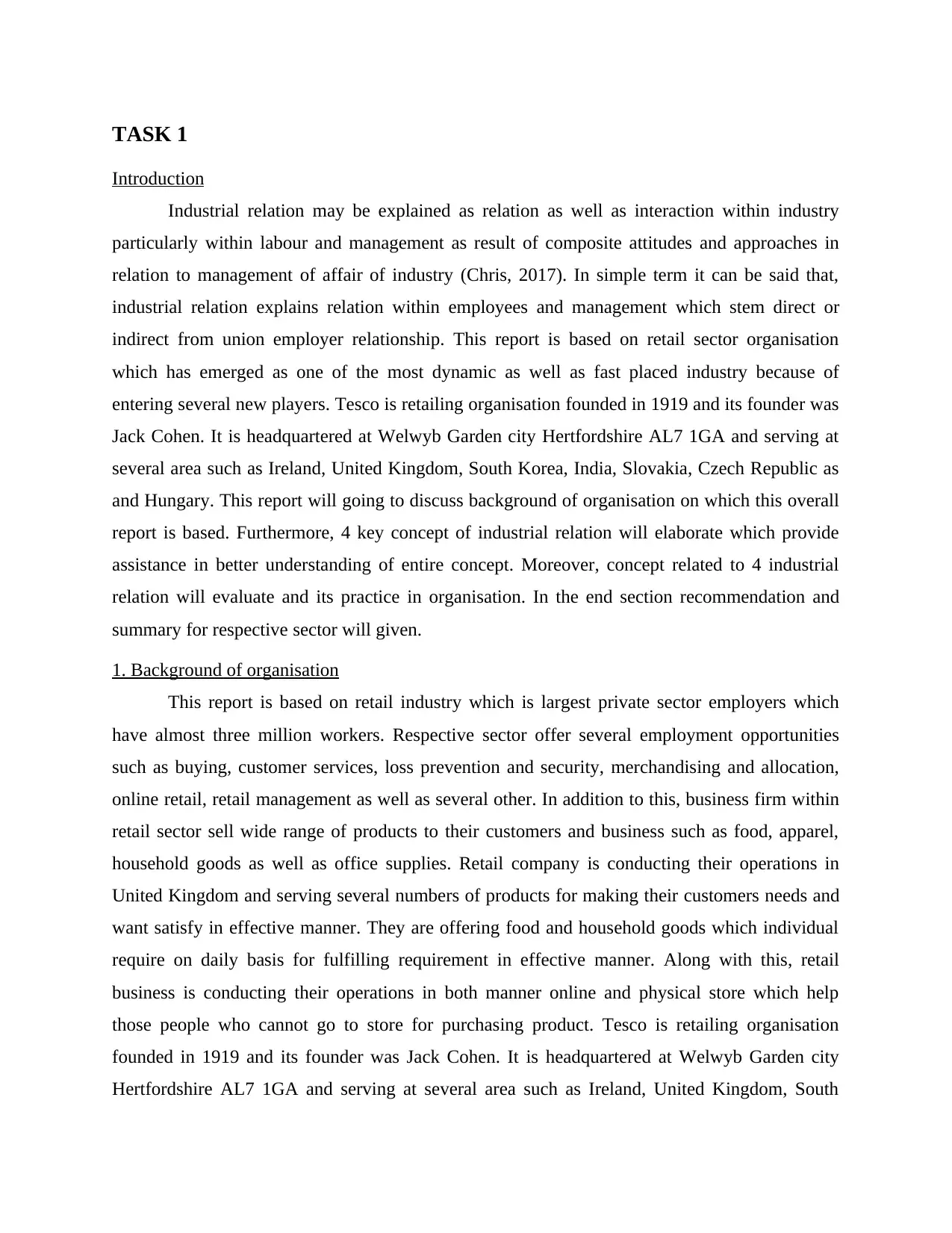
TASK 1
Introduction
Industrial relation may be explained as relation as well as interaction within industry
particularly within labour and management as result of composite attitudes and approaches in
relation to management of affair of industry (Chris, 2017). In simple term it can be said that,
industrial relation explains relation within employees and management which stem direct or
indirect from union employer relationship. This report is based on retail sector organisation
which has emerged as one of the most dynamic as well as fast placed industry because of
entering several new players. Tesco is retailing organisation founded in 1919 and its founder was
Jack Cohen. It is headquartered at Welwyb Garden city Hertfordshire AL7 1GA and serving at
several area such as Ireland, United Kingdom, South Korea, India, Slovakia, Czech Republic as
and Hungary. This report will going to discuss background of organisation on which this overall
report is based. Furthermore, 4 key concept of industrial relation will elaborate which provide
assistance in better understanding of entire concept. Moreover, concept related to 4 industrial
relation will evaluate and its practice in organisation. In the end section recommendation and
summary for respective sector will given.
1. Background of organisation
This report is based on retail industry which is largest private sector employers which
have almost three million workers. Respective sector offer several employment opportunities
such as buying, customer services, loss prevention and security, merchandising and allocation,
online retail, retail management as well as several other. In addition to this, business firm within
retail sector sell wide range of products to their customers and business such as food, apparel,
household goods as well as office supplies. Retail company is conducting their operations in
United Kingdom and serving several numbers of products for making their customers needs and
want satisfy in effective manner. They are offering food and household goods which individual
require on daily basis for fulfilling requirement in effective manner. Along with this, retail
business is conducting their operations in both manner online and physical store which help
those people who cannot go to store for purchasing product. Tesco is retailing organisation
founded in 1919 and its founder was Jack Cohen. It is headquartered at Welwyb Garden city
Hertfordshire AL7 1GA and serving at several area such as Ireland, United Kingdom, South
Introduction
Industrial relation may be explained as relation as well as interaction within industry
particularly within labour and management as result of composite attitudes and approaches in
relation to management of affair of industry (Chris, 2017). In simple term it can be said that,
industrial relation explains relation within employees and management which stem direct or
indirect from union employer relationship. This report is based on retail sector organisation
which has emerged as one of the most dynamic as well as fast placed industry because of
entering several new players. Tesco is retailing organisation founded in 1919 and its founder was
Jack Cohen. It is headquartered at Welwyb Garden city Hertfordshire AL7 1GA and serving at
several area such as Ireland, United Kingdom, South Korea, India, Slovakia, Czech Republic as
and Hungary. This report will going to discuss background of organisation on which this overall
report is based. Furthermore, 4 key concept of industrial relation will elaborate which provide
assistance in better understanding of entire concept. Moreover, concept related to 4 industrial
relation will evaluate and its practice in organisation. In the end section recommendation and
summary for respective sector will given.
1. Background of organisation
This report is based on retail industry which is largest private sector employers which
have almost three million workers. Respective sector offer several employment opportunities
such as buying, customer services, loss prevention and security, merchandising and allocation,
online retail, retail management as well as several other. In addition to this, business firm within
retail sector sell wide range of products to their customers and business such as food, apparel,
household goods as well as office supplies. Retail company is conducting their operations in
United Kingdom and serving several numbers of products for making their customers needs and
want satisfy in effective manner. They are offering food and household goods which individual
require on daily basis for fulfilling requirement in effective manner. Along with this, retail
business is conducting their operations in both manner online and physical store which help
those people who cannot go to store for purchasing product. Tesco is retailing organisation
founded in 1919 and its founder was Jack Cohen. It is headquartered at Welwyb Garden city
Hertfordshire AL7 1GA and serving at several area such as Ireland, United Kingdom, South
⊘ This is a preview!⊘
Do you want full access?
Subscribe today to unlock all pages.

Trusted by 1+ million students worldwide
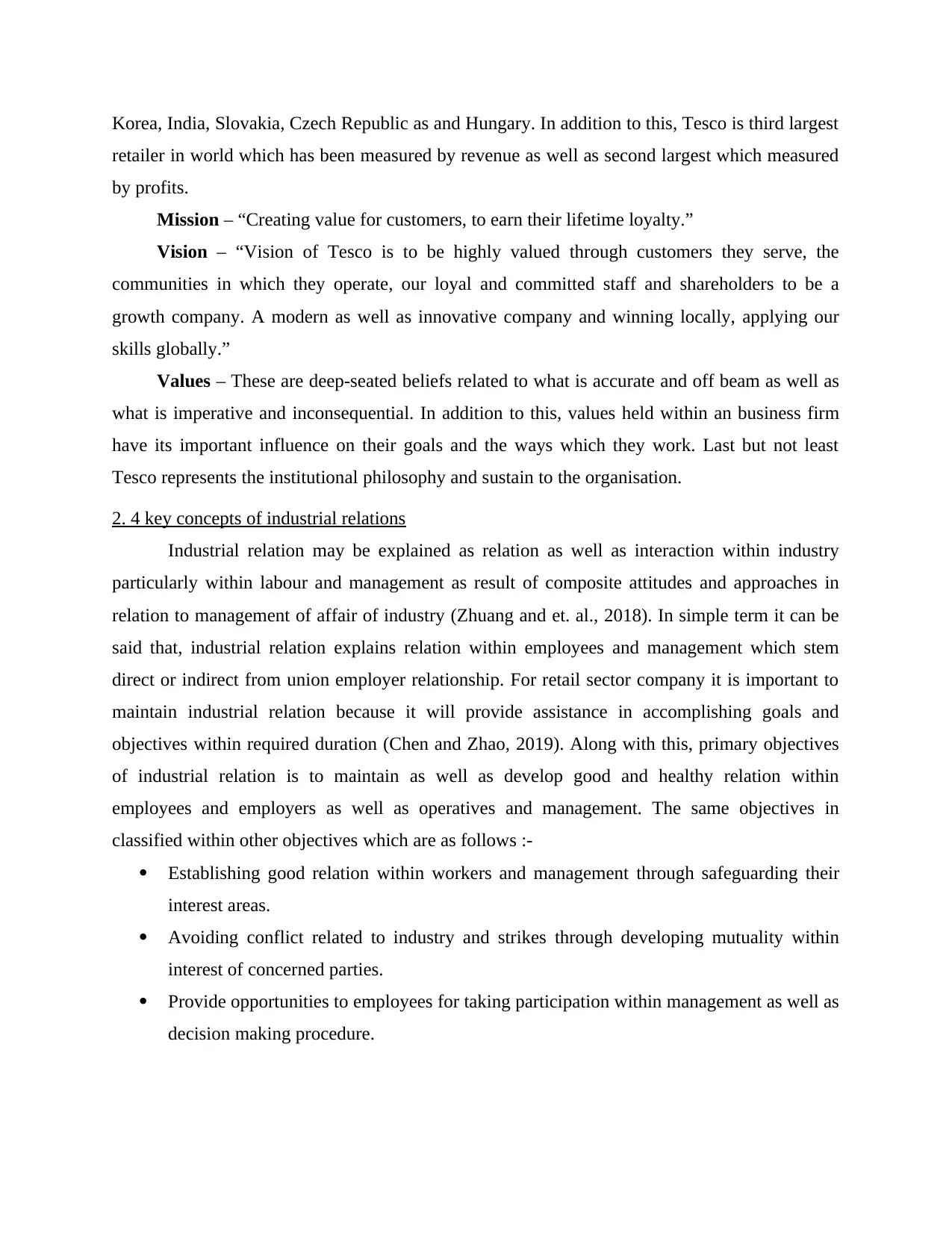
Korea, India, Slovakia, Czech Republic as and Hungary. In addition to this, Tesco is third largest
retailer in world which has been measured by revenue as well as second largest which measured
by profits.
Mission – “Creating value for customers, to earn their lifetime loyalty.”
Vision – “Vision of Tesco is to be highly valued through customers they serve, the
communities in which they operate, our loyal and committed staff and shareholders to be a
growth company. A modern as well as innovative company and winning locally, applying our
skills globally.”
Values – These are deep-seated beliefs related to what is accurate and off beam as well as
what is imperative and inconsequential. In addition to this, values held within an business firm
have its important influence on their goals and the ways which they work. Last but not least
Tesco represents the institutional philosophy and sustain to the organisation.
2. 4 key concepts of industrial relations
Industrial relation may be explained as relation as well as interaction within industry
particularly within labour and management as result of composite attitudes and approaches in
relation to management of affair of industry (Zhuang and et. al., 2018). In simple term it can be
said that, industrial relation explains relation within employees and management which stem
direct or indirect from union employer relationship. For retail sector company it is important to
maintain industrial relation because it will provide assistance in accomplishing goals and
objectives within required duration (Chen and Zhao, 2019). Along with this, primary objectives
of industrial relation is to maintain as well as develop good and healthy relation within
employees and employers as well as operatives and management. The same objectives in
classified within other objectives which are as follows :-
Establishing good relation within workers and management through safeguarding their
interest areas.
Avoiding conflict related to industry and strikes through developing mutuality within
interest of concerned parties.
Provide opportunities to employees for taking participation within management as well as
decision making procedure.
retailer in world which has been measured by revenue as well as second largest which measured
by profits.
Mission – “Creating value for customers, to earn their lifetime loyalty.”
Vision – “Vision of Tesco is to be highly valued through customers they serve, the
communities in which they operate, our loyal and committed staff and shareholders to be a
growth company. A modern as well as innovative company and winning locally, applying our
skills globally.”
Values – These are deep-seated beliefs related to what is accurate and off beam as well as
what is imperative and inconsequential. In addition to this, values held within an business firm
have its important influence on their goals and the ways which they work. Last but not least
Tesco represents the institutional philosophy and sustain to the organisation.
2. 4 key concepts of industrial relations
Industrial relation may be explained as relation as well as interaction within industry
particularly within labour and management as result of composite attitudes and approaches in
relation to management of affair of industry (Zhuang and et. al., 2018). In simple term it can be
said that, industrial relation explains relation within employees and management which stem
direct or indirect from union employer relationship. For retail sector company it is important to
maintain industrial relation because it will provide assistance in accomplishing goals and
objectives within required duration (Chen and Zhao, 2019). Along with this, primary objectives
of industrial relation is to maintain as well as develop good and healthy relation within
employees and employers as well as operatives and management. The same objectives in
classified within other objectives which are as follows :-
Establishing good relation within workers and management through safeguarding their
interest areas.
Avoiding conflict related to industry and strikes through developing mutuality within
interest of concerned parties.
Provide opportunities to employees for taking participation within management as well as
decision making procedure.
Paraphrase This Document
Need a fresh take? Get an instant paraphrase of this document with our AI Paraphraser
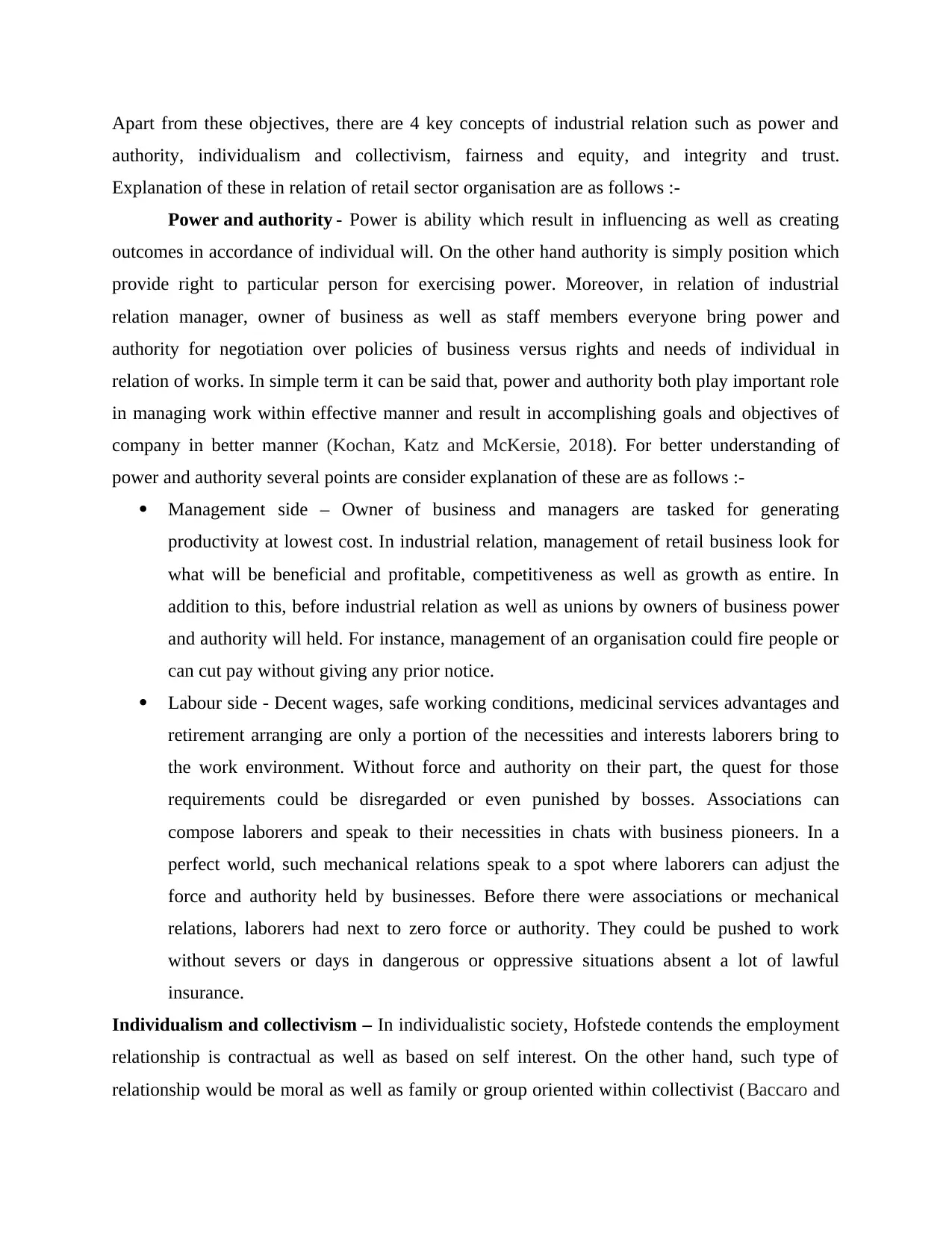
Apart from these objectives, there are 4 key concepts of industrial relation such as power and
authority, individualism and collectivism, fairness and equity, and integrity and trust.
Explanation of these in relation of retail sector organisation are as follows :-
Power and authority - Power is ability which result in influencing as well as creating
outcomes in accordance of individual will. On the other hand authority is simply position which
provide right to particular person for exercising power. Moreover, in relation of industrial
relation manager, owner of business as well as staff members everyone bring power and
authority for negotiation over policies of business versus rights and needs of individual in
relation of works. In simple term it can be said that, power and authority both play important role
in managing work within effective manner and result in accomplishing goals and objectives of
company in better manner (Kochan, Katz and McKersie, 2018). For better understanding of
power and authority several points are consider explanation of these are as follows :-
Management side – Owner of business and managers are tasked for generating
productivity at lowest cost. In industrial relation, management of retail business look for
what will be beneficial and profitable, competitiveness as well as growth as entire. In
addition to this, before industrial relation as well as unions by owners of business power
and authority will held. For instance, management of an organisation could fire people or
can cut pay without giving any prior notice.
Labour side - Decent wages, safe working conditions, medicinal services advantages and
retirement arranging are only a portion of the necessities and interests laborers bring to
the work environment. Without force and authority on their part, the quest for those
requirements could be disregarded or even punished by bosses. Associations can
compose laborers and speak to their necessities in chats with business pioneers. In a
perfect world, such mechanical relations speak to a spot where laborers can adjust the
force and authority held by businesses. Before there were associations or mechanical
relations, laborers had next to zero force or authority. They could be pushed to work
without severs or days in dangerous or oppressive situations absent a lot of lawful
insurance.
Individualism and collectivism – In individualistic society, Hofstede contends the employment
relationship is contractual as well as based on self interest. On the other hand, such type of
relationship would be moral as well as family or group oriented within collectivist (Baccaro and
authority, individualism and collectivism, fairness and equity, and integrity and trust.
Explanation of these in relation of retail sector organisation are as follows :-
Power and authority - Power is ability which result in influencing as well as creating
outcomes in accordance of individual will. On the other hand authority is simply position which
provide right to particular person for exercising power. Moreover, in relation of industrial
relation manager, owner of business as well as staff members everyone bring power and
authority for negotiation over policies of business versus rights and needs of individual in
relation of works. In simple term it can be said that, power and authority both play important role
in managing work within effective manner and result in accomplishing goals and objectives of
company in better manner (Kochan, Katz and McKersie, 2018). For better understanding of
power and authority several points are consider explanation of these are as follows :-
Management side – Owner of business and managers are tasked for generating
productivity at lowest cost. In industrial relation, management of retail business look for
what will be beneficial and profitable, competitiveness as well as growth as entire. In
addition to this, before industrial relation as well as unions by owners of business power
and authority will held. For instance, management of an organisation could fire people or
can cut pay without giving any prior notice.
Labour side - Decent wages, safe working conditions, medicinal services advantages and
retirement arranging are only a portion of the necessities and interests laborers bring to
the work environment. Without force and authority on their part, the quest for those
requirements could be disregarded or even punished by bosses. Associations can
compose laborers and speak to their necessities in chats with business pioneers. In a
perfect world, such mechanical relations speak to a spot where laborers can adjust the
force and authority held by businesses. Before there were associations or mechanical
relations, laborers had next to zero force or authority. They could be pushed to work
without severs or days in dangerous or oppressive situations absent a lot of lawful
insurance.
Individualism and collectivism – In individualistic society, Hofstede contends the employment
relationship is contractual as well as based on self interest. On the other hand, such type of
relationship would be moral as well as family or group oriented within collectivist (Baccaro and
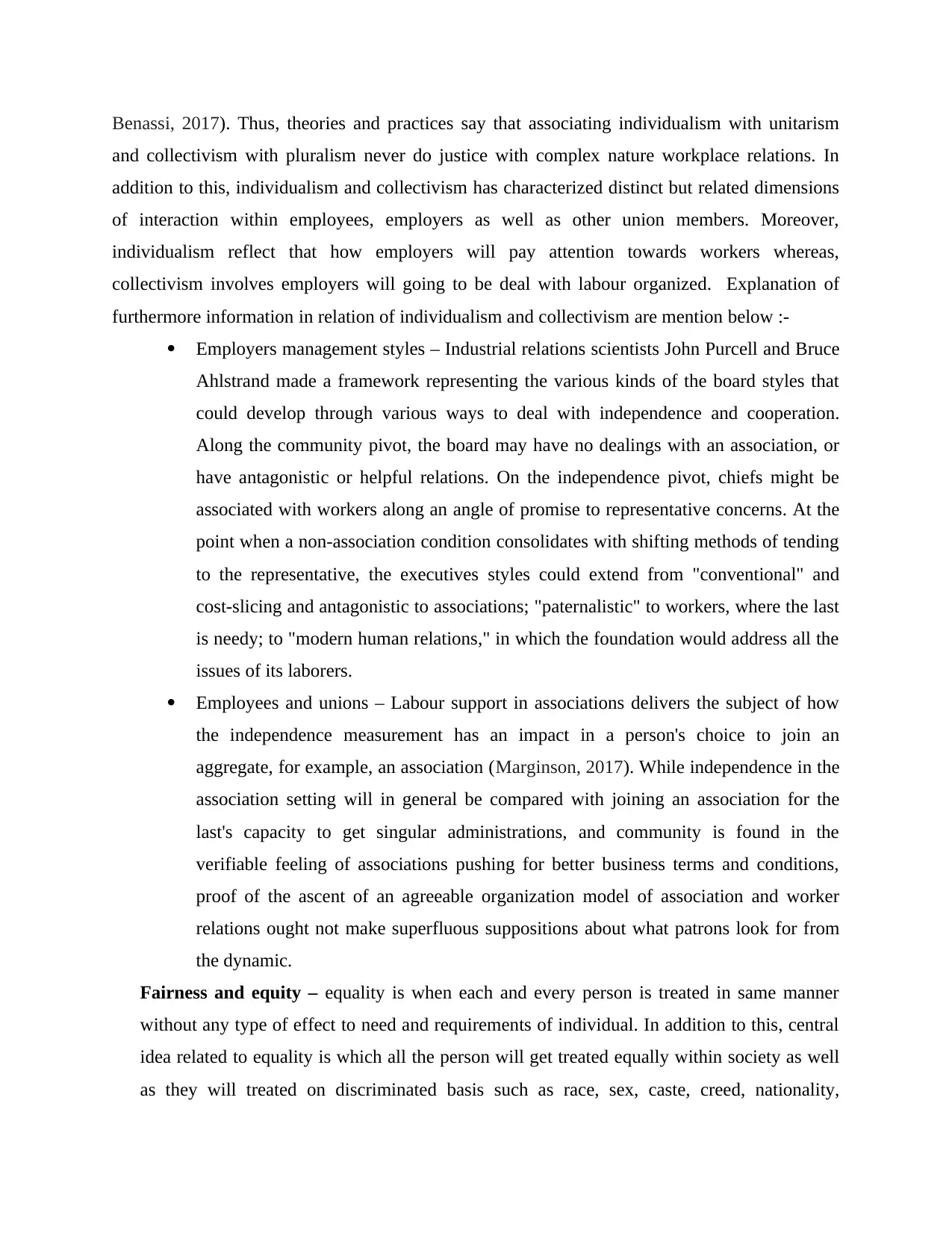
Benassi, 2017). Thus, theories and practices say that associating individualism with unitarism
and collectivism with pluralism never do justice with complex nature workplace relations. In
addition to this, individualism and collectivism has characterized distinct but related dimensions
of interaction within employees, employers as well as other union members. Moreover,
individualism reflect that how employers will pay attention towards workers whereas,
collectivism involves employers will going to be deal with labour organized. Explanation of
furthermore information in relation of individualism and collectivism are mention below :-
Employers management styles – Industrial relations scientists John Purcell and Bruce
Ahlstrand made a framework representing the various kinds of the board styles that
could develop through various ways to deal with independence and cooperation.
Along the community pivot, the board may have no dealings with an association, or
have antagonistic or helpful relations. On the independence pivot, chiefs might be
associated with workers along an angle of promise to representative concerns. At the
point when a non-association condition consolidates with shifting methods of tending
to the representative, the executives styles could extend from "conventional" and
cost-slicing and antagonistic to associations; "paternalistic" to workers, where the last
is needy; to "modern human relations," in which the foundation would address all the
issues of its laborers.
Employees and unions – Labour support in associations delivers the subject of how
the independence measurement has an impact in a person's choice to join an
aggregate, for example, an association (Marginson, 2017). While independence in the
association setting will in general be compared with joining an association for the
last's capacity to get singular administrations, and community is found in the
verifiable feeling of associations pushing for better business terms and conditions,
proof of the ascent of an agreeable organization model of association and worker
relations ought not make superfluous suppositions about what patrons look for from
the dynamic.
Fairness and equity – equality is when each and every person is treated in same manner
without any type of effect to need and requirements of individual. In addition to this, central
idea related to equality is which all the person will get treated equally within society as well
as they will treated on discriminated basis such as race, sex, caste, creed, nationality,
and collectivism with pluralism never do justice with complex nature workplace relations. In
addition to this, individualism and collectivism has characterized distinct but related dimensions
of interaction within employees, employers as well as other union members. Moreover,
individualism reflect that how employers will pay attention towards workers whereas,
collectivism involves employers will going to be deal with labour organized. Explanation of
furthermore information in relation of individualism and collectivism are mention below :-
Employers management styles – Industrial relations scientists John Purcell and Bruce
Ahlstrand made a framework representing the various kinds of the board styles that
could develop through various ways to deal with independence and cooperation.
Along the community pivot, the board may have no dealings with an association, or
have antagonistic or helpful relations. On the independence pivot, chiefs might be
associated with workers along an angle of promise to representative concerns. At the
point when a non-association condition consolidates with shifting methods of tending
to the representative, the executives styles could extend from "conventional" and
cost-slicing and antagonistic to associations; "paternalistic" to workers, where the last
is needy; to "modern human relations," in which the foundation would address all the
issues of its laborers.
Employees and unions – Labour support in associations delivers the subject of how
the independence measurement has an impact in a person's choice to join an
aggregate, for example, an association (Marginson, 2017). While independence in the
association setting will in general be compared with joining an association for the
last's capacity to get singular administrations, and community is found in the
verifiable feeling of associations pushing for better business terms and conditions,
proof of the ascent of an agreeable organization model of association and worker
relations ought not make superfluous suppositions about what patrons look for from
the dynamic.
Fairness and equity – equality is when each and every person is treated in same manner
without any type of effect to need and requirements of individual. In addition to this, central
idea related to equality is which all the person will get treated equally within society as well
as they will treated on discriminated basis such as race, sex, caste, creed, nationality,
⊘ This is a preview!⊘
Do you want full access?
Subscribe today to unlock all pages.

Trusted by 1+ million students worldwide
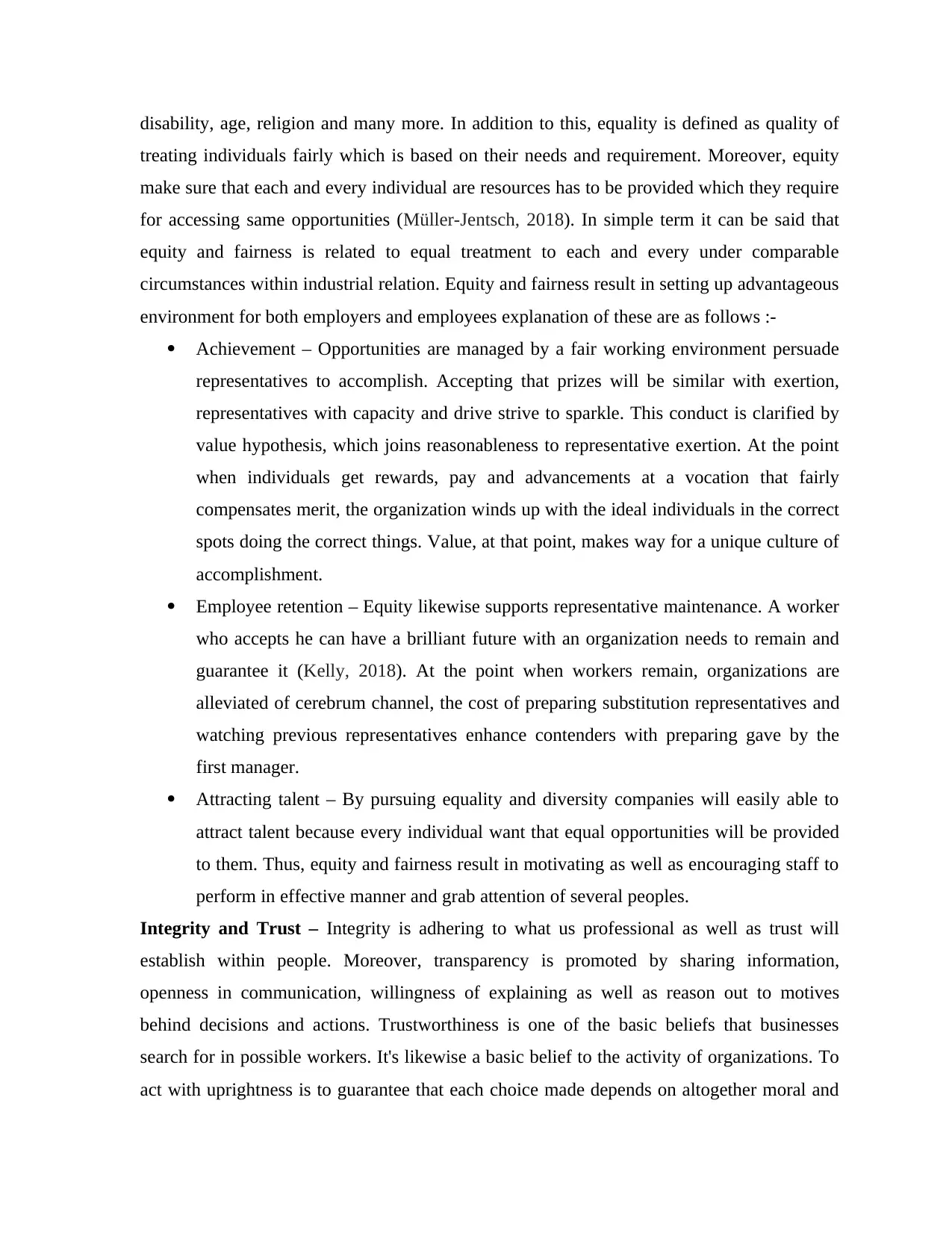
disability, age, religion and many more. In addition to this, equality is defined as quality of
treating individuals fairly which is based on their needs and requirement. Moreover, equity
make sure that each and every individual are resources has to be provided which they require
for accessing same opportunities (Müller-Jentsch, 2018). In simple term it can be said that
equity and fairness is related to equal treatment to each and every under comparable
circumstances within industrial relation. Equity and fairness result in setting up advantageous
environment for both employers and employees explanation of these are as follows :-
Achievement – Opportunities are managed by a fair working environment persuade
representatives to accomplish. Accepting that prizes will be similar with exertion,
representatives with capacity and drive strive to sparkle. This conduct is clarified by
value hypothesis, which joins reasonableness to representative exertion. At the point
when individuals get rewards, pay and advancements at a vocation that fairly
compensates merit, the organization winds up with the ideal individuals in the correct
spots doing the correct things. Value, at that point, makes way for a unique culture of
accomplishment.
Employee retention – Equity likewise supports representative maintenance. A worker
who accepts he can have a brilliant future with an organization needs to remain and
guarantee it (Kelly, 2018). At the point when workers remain, organizations are
alleviated of cerebrum channel, the cost of preparing substitution representatives and
watching previous representatives enhance contenders with preparing gave by the
first manager.
Attracting talent – By pursuing equality and diversity companies will easily able to
attract talent because every individual want that equal opportunities will be provided
to them. Thus, equity and fairness result in motivating as well as encouraging staff to
perform in effective manner and grab attention of several peoples.
Integrity and Trust – Integrity is adhering to what us professional as well as trust will
establish within people. Moreover, transparency is promoted by sharing information,
openness in communication, willingness of explaining as well as reason out to motives
behind decisions and actions. Trustworthiness is one of the basic beliefs that businesses
search for in possible workers. It's likewise a basic belief to the activity of organizations. To
act with uprightness is to guarantee that each choice made depends on altogether moral and
treating individuals fairly which is based on their needs and requirement. Moreover, equity
make sure that each and every individual are resources has to be provided which they require
for accessing same opportunities (Müller-Jentsch, 2018). In simple term it can be said that
equity and fairness is related to equal treatment to each and every under comparable
circumstances within industrial relation. Equity and fairness result in setting up advantageous
environment for both employers and employees explanation of these are as follows :-
Achievement – Opportunities are managed by a fair working environment persuade
representatives to accomplish. Accepting that prizes will be similar with exertion,
representatives with capacity and drive strive to sparkle. This conduct is clarified by
value hypothesis, which joins reasonableness to representative exertion. At the point
when individuals get rewards, pay and advancements at a vocation that fairly
compensates merit, the organization winds up with the ideal individuals in the correct
spots doing the correct things. Value, at that point, makes way for a unique culture of
accomplishment.
Employee retention – Equity likewise supports representative maintenance. A worker
who accepts he can have a brilliant future with an organization needs to remain and
guarantee it (Kelly, 2018). At the point when workers remain, organizations are
alleviated of cerebrum channel, the cost of preparing substitution representatives and
watching previous representatives enhance contenders with preparing gave by the
first manager.
Attracting talent – By pursuing equality and diversity companies will easily able to
attract talent because every individual want that equal opportunities will be provided
to them. Thus, equity and fairness result in motivating as well as encouraging staff to
perform in effective manner and grab attention of several peoples.
Integrity and Trust – Integrity is adhering to what us professional as well as trust will
establish within people. Moreover, transparency is promoted by sharing information,
openness in communication, willingness of explaining as well as reason out to motives
behind decisions and actions. Trustworthiness is one of the basic beliefs that businesses
search for in possible workers. It's likewise a basic belief to the activity of organizations. To
act with uprightness is to guarantee that each choice made depends on altogether moral and
Paraphrase This Document
Need a fresh take? Get an instant paraphrase of this document with our AI Paraphraser
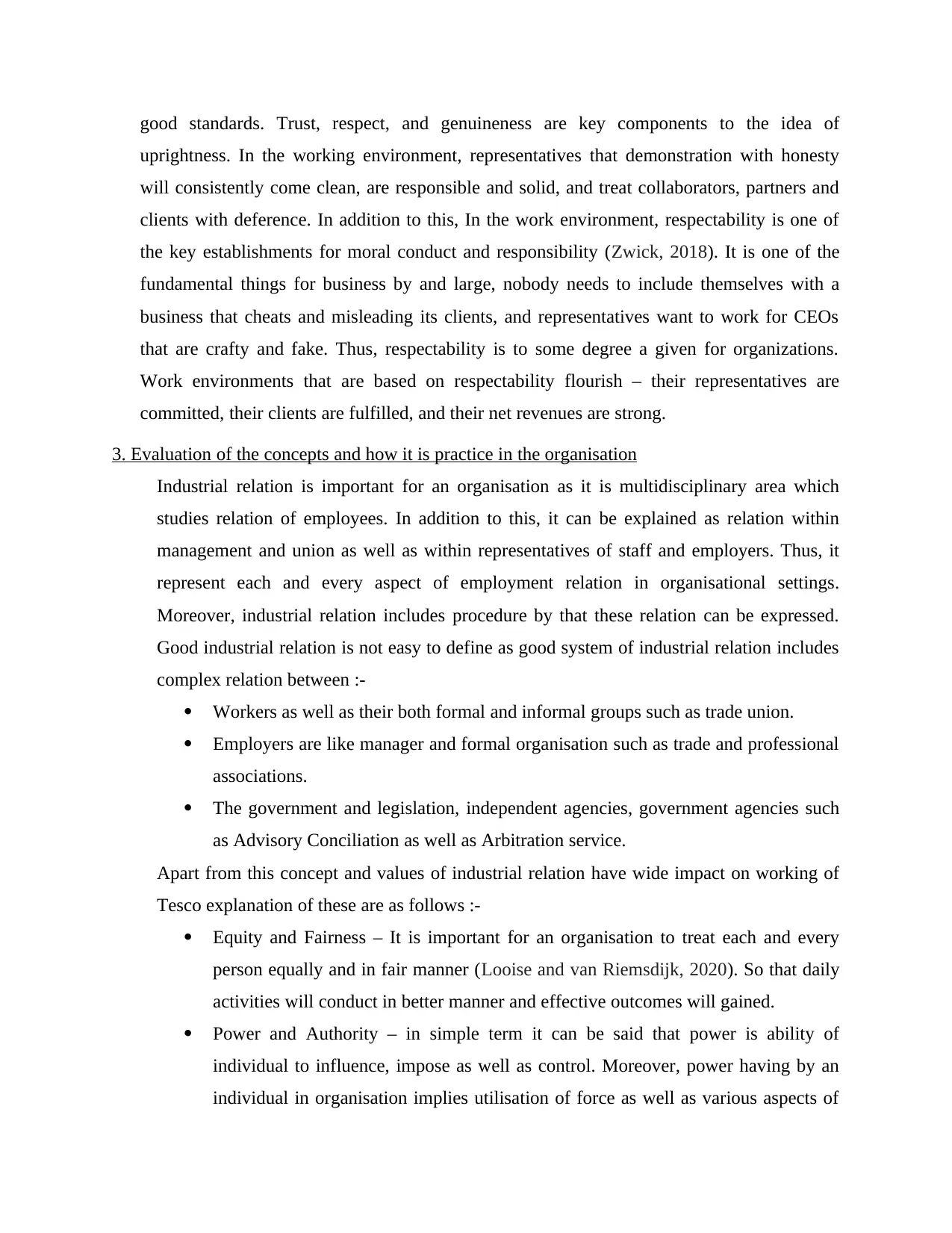
good standards. Trust, respect, and genuineness are key components to the idea of
uprightness. In the working environment, representatives that demonstration with honesty
will consistently come clean, are responsible and solid, and treat collaborators, partners and
clients with deference. In addition to this, In the work environment, respectability is one of
the key establishments for moral conduct and responsibility (Zwick, 2018). It is one of the
fundamental things for business by and large, nobody needs to include themselves with a
business that cheats and misleading its clients, and representatives want to work for CEOs
that are crafty and fake. Thus, respectability is to some degree a given for organizations.
Work environments that are based on respectability flourish – their representatives are
committed, their clients are fulfilled, and their net revenues are strong.
3. Evaluation of the concepts and how it is practice in the organisation
Industrial relation is important for an organisation as it is multidisciplinary area which
studies relation of employees. In addition to this, it can be explained as relation within
management and union as well as within representatives of staff and employers. Thus, it
represent each and every aspect of employment relation in organisational settings.
Moreover, industrial relation includes procedure by that these relation can be expressed.
Good industrial relation is not easy to define as good system of industrial relation includes
complex relation between :-
Workers as well as their both formal and informal groups such as trade union.
Employers are like manager and formal organisation such as trade and professional
associations.
The government and legislation, independent agencies, government agencies such
as Advisory Conciliation as well as Arbitration service.
Apart from this concept and values of industrial relation have wide impact on working of
Tesco explanation of these are as follows :-
Equity and Fairness – It is important for an organisation to treat each and every
person equally and in fair manner (Looise and van Riemsdijk, 2020). So that daily
activities will conduct in better manner and effective outcomes will gained.
Power and Authority – in simple term it can be said that power is ability of
individual to influence, impose as well as control. Moreover, power having by an
individual in organisation implies utilisation of force as well as various aspects of
uprightness. In the working environment, representatives that demonstration with honesty
will consistently come clean, are responsible and solid, and treat collaborators, partners and
clients with deference. In addition to this, In the work environment, respectability is one of
the key establishments for moral conduct and responsibility (Zwick, 2018). It is one of the
fundamental things for business by and large, nobody needs to include themselves with a
business that cheats and misleading its clients, and representatives want to work for CEOs
that are crafty and fake. Thus, respectability is to some degree a given for organizations.
Work environments that are based on respectability flourish – their representatives are
committed, their clients are fulfilled, and their net revenues are strong.
3. Evaluation of the concepts and how it is practice in the organisation
Industrial relation is important for an organisation as it is multidisciplinary area which
studies relation of employees. In addition to this, it can be explained as relation within
management and union as well as within representatives of staff and employers. Thus, it
represent each and every aspect of employment relation in organisational settings.
Moreover, industrial relation includes procedure by that these relation can be expressed.
Good industrial relation is not easy to define as good system of industrial relation includes
complex relation between :-
Workers as well as their both formal and informal groups such as trade union.
Employers are like manager and formal organisation such as trade and professional
associations.
The government and legislation, independent agencies, government agencies such
as Advisory Conciliation as well as Arbitration service.
Apart from this concept and values of industrial relation have wide impact on working of
Tesco explanation of these are as follows :-
Equity and Fairness – It is important for an organisation to treat each and every
person equally and in fair manner (Looise and van Riemsdijk, 2020). So that daily
activities will conduct in better manner and effective outcomes will gained.
Power and Authority – in simple term it can be said that power is ability of
individual to influence, impose as well as control. Moreover, power having by an
individual in organisation implies utilisation of force as well as various aspects of
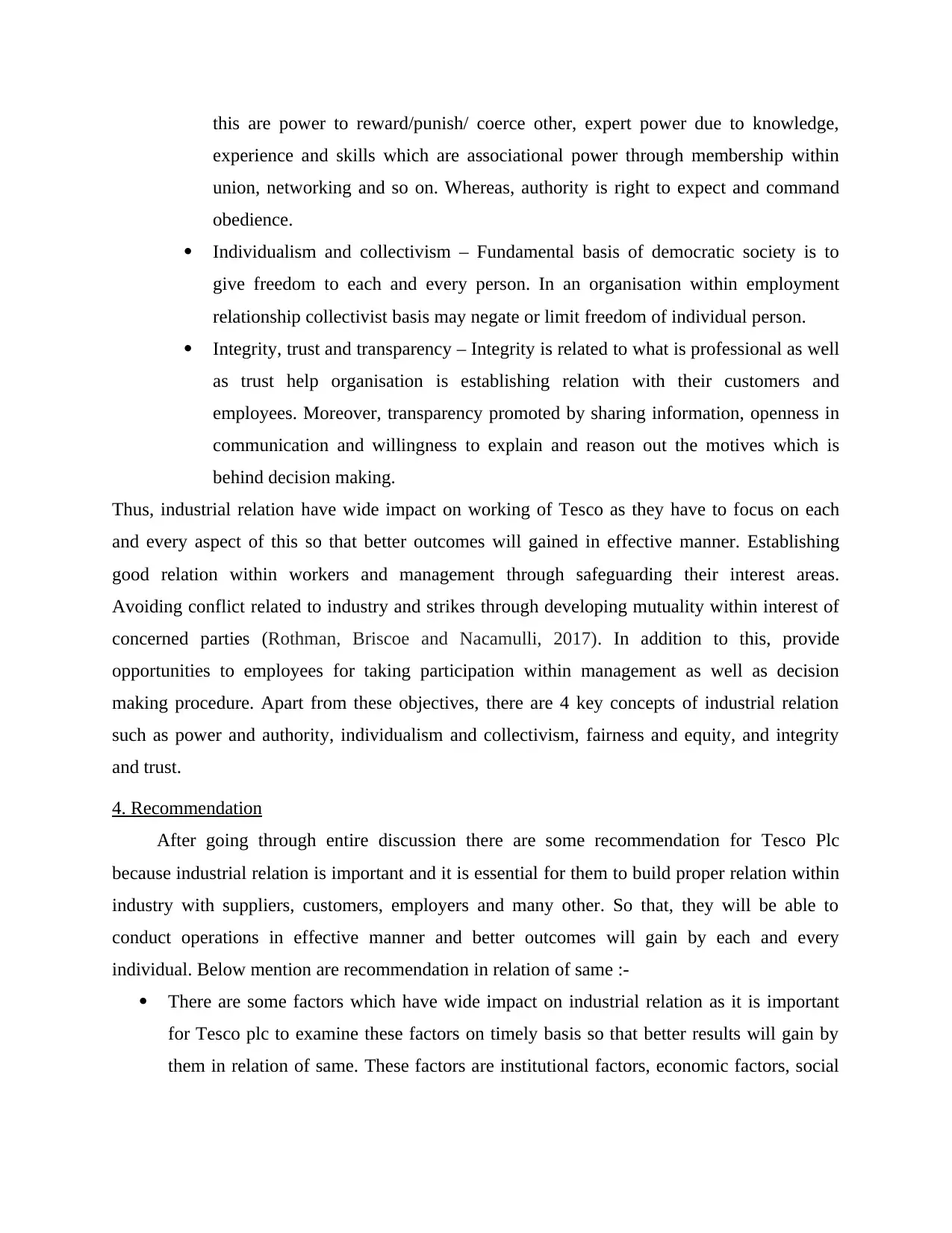
this are power to reward/punish/ coerce other, expert power due to knowledge,
experience and skills which are associational power through membership within
union, networking and so on. Whereas, authority is right to expect and command
obedience.
Individualism and collectivism – Fundamental basis of democratic society is to
give freedom to each and every person. In an organisation within employment
relationship collectivist basis may negate or limit freedom of individual person.
Integrity, trust and transparency – Integrity is related to what is professional as well
as trust help organisation is establishing relation with their customers and
employees. Moreover, transparency promoted by sharing information, openness in
communication and willingness to explain and reason out the motives which is
behind decision making.
Thus, industrial relation have wide impact on working of Tesco as they have to focus on each
and every aspect of this so that better outcomes will gained in effective manner. Establishing
good relation within workers and management through safeguarding their interest areas.
Avoiding conflict related to industry and strikes through developing mutuality within interest of
concerned parties (Rothman, Briscoe and Nacamulli, 2017). In addition to this, provide
opportunities to employees for taking participation within management as well as decision
making procedure. Apart from these objectives, there are 4 key concepts of industrial relation
such as power and authority, individualism and collectivism, fairness and equity, and integrity
and trust.
4. Recommendation
After going through entire discussion there are some recommendation for Tesco Plc
because industrial relation is important and it is essential for them to build proper relation within
industry with suppliers, customers, employers and many other. So that, they will be able to
conduct operations in effective manner and better outcomes will gain by each and every
individual. Below mention are recommendation in relation of same :-
There are some factors which have wide impact on industrial relation as it is important
for Tesco plc to examine these factors on timely basis so that better results will gain by
them in relation of same. These factors are institutional factors, economic factors, social
experience and skills which are associational power through membership within
union, networking and so on. Whereas, authority is right to expect and command
obedience.
Individualism and collectivism – Fundamental basis of democratic society is to
give freedom to each and every person. In an organisation within employment
relationship collectivist basis may negate or limit freedom of individual person.
Integrity, trust and transparency – Integrity is related to what is professional as well
as trust help organisation is establishing relation with their customers and
employees. Moreover, transparency promoted by sharing information, openness in
communication and willingness to explain and reason out the motives which is
behind decision making.
Thus, industrial relation have wide impact on working of Tesco as they have to focus on each
and every aspect of this so that better outcomes will gained in effective manner. Establishing
good relation within workers and management through safeguarding their interest areas.
Avoiding conflict related to industry and strikes through developing mutuality within interest of
concerned parties (Rothman, Briscoe and Nacamulli, 2017). In addition to this, provide
opportunities to employees for taking participation within management as well as decision
making procedure. Apart from these objectives, there are 4 key concepts of industrial relation
such as power and authority, individualism and collectivism, fairness and equity, and integrity
and trust.
4. Recommendation
After going through entire discussion there are some recommendation for Tesco Plc
because industrial relation is important and it is essential for them to build proper relation within
industry with suppliers, customers, employers and many other. So that, they will be able to
conduct operations in effective manner and better outcomes will gain by each and every
individual. Below mention are recommendation in relation of same :-
There are some factors which have wide impact on industrial relation as it is important
for Tesco plc to examine these factors on timely basis so that better results will gain by
them in relation of same. These factors are institutional factors, economic factors, social
⊘ This is a preview!⊘
Do you want full access?
Subscribe today to unlock all pages.

Trusted by 1+ million students worldwide
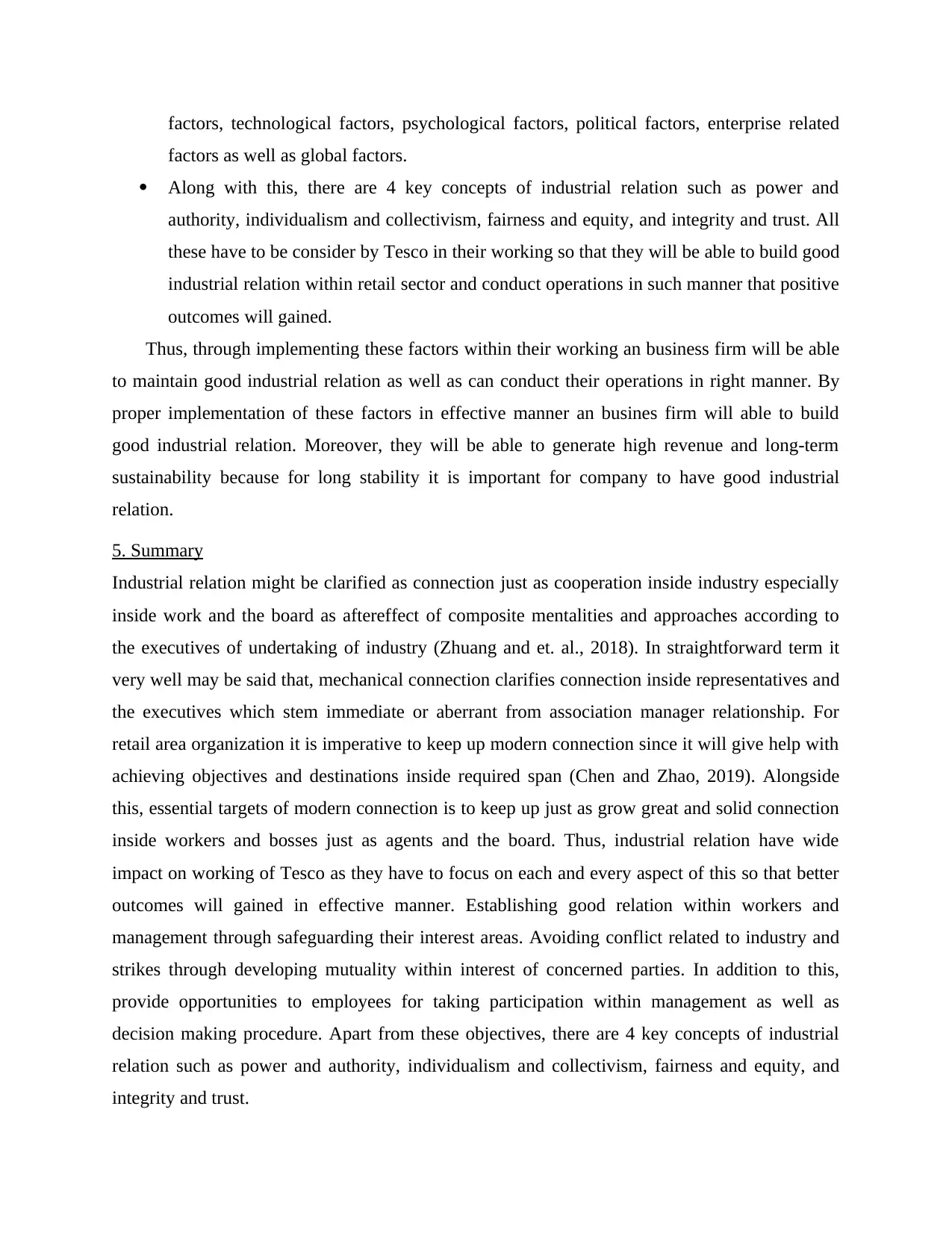
factors, technological factors, psychological factors, political factors, enterprise related
factors as well as global factors.
Along with this, there are 4 key concepts of industrial relation such as power and
authority, individualism and collectivism, fairness and equity, and integrity and trust. All
these have to be consider by Tesco in their working so that they will be able to build good
industrial relation within retail sector and conduct operations in such manner that positive
outcomes will gained.
Thus, through implementing these factors within their working an business firm will be able
to maintain good industrial relation as well as can conduct their operations in right manner. By
proper implementation of these factors in effective manner an busines firm will able to build
good industrial relation. Moreover, they will be able to generate high revenue and long-term
sustainability because for long stability it is important for company to have good industrial
relation.
5. Summary
Industrial relation might be clarified as connection just as cooperation inside industry especially
inside work and the board as aftereffect of composite mentalities and approaches according to
the executives of undertaking of industry (Zhuang and et. al., 2018). In straightforward term it
very well may be said that, mechanical connection clarifies connection inside representatives and
the executives which stem immediate or aberrant from association manager relationship. For
retail area organization it is imperative to keep up modern connection since it will give help with
achieving objectives and destinations inside required span (Chen and Zhao, 2019). Alongside
this, essential targets of modern connection is to keep up just as grow great and solid connection
inside workers and bosses just as agents and the board. Thus, industrial relation have wide
impact on working of Tesco as they have to focus on each and every aspect of this so that better
outcomes will gained in effective manner. Establishing good relation within workers and
management through safeguarding their interest areas. Avoiding conflict related to industry and
strikes through developing mutuality within interest of concerned parties. In addition to this,
provide opportunities to employees for taking participation within management as well as
decision making procedure. Apart from these objectives, there are 4 key concepts of industrial
relation such as power and authority, individualism and collectivism, fairness and equity, and
integrity and trust.
factors as well as global factors.
Along with this, there are 4 key concepts of industrial relation such as power and
authority, individualism and collectivism, fairness and equity, and integrity and trust. All
these have to be consider by Tesco in their working so that they will be able to build good
industrial relation within retail sector and conduct operations in such manner that positive
outcomes will gained.
Thus, through implementing these factors within their working an business firm will be able
to maintain good industrial relation as well as can conduct their operations in right manner. By
proper implementation of these factors in effective manner an busines firm will able to build
good industrial relation. Moreover, they will be able to generate high revenue and long-term
sustainability because for long stability it is important for company to have good industrial
relation.
5. Summary
Industrial relation might be clarified as connection just as cooperation inside industry especially
inside work and the board as aftereffect of composite mentalities and approaches according to
the executives of undertaking of industry (Zhuang and et. al., 2018). In straightforward term it
very well may be said that, mechanical connection clarifies connection inside representatives and
the executives which stem immediate or aberrant from association manager relationship. For
retail area organization it is imperative to keep up modern connection since it will give help with
achieving objectives and destinations inside required span (Chen and Zhao, 2019). Alongside
this, essential targets of modern connection is to keep up just as grow great and solid connection
inside workers and bosses just as agents and the board. Thus, industrial relation have wide
impact on working of Tesco as they have to focus on each and every aspect of this so that better
outcomes will gained in effective manner. Establishing good relation within workers and
management through safeguarding their interest areas. Avoiding conflict related to industry and
strikes through developing mutuality within interest of concerned parties. In addition to this,
provide opportunities to employees for taking participation within management as well as
decision making procedure. Apart from these objectives, there are 4 key concepts of industrial
relation such as power and authority, individualism and collectivism, fairness and equity, and
integrity and trust.
Paraphrase This Document
Need a fresh take? Get an instant paraphrase of this document with our AI Paraphraser
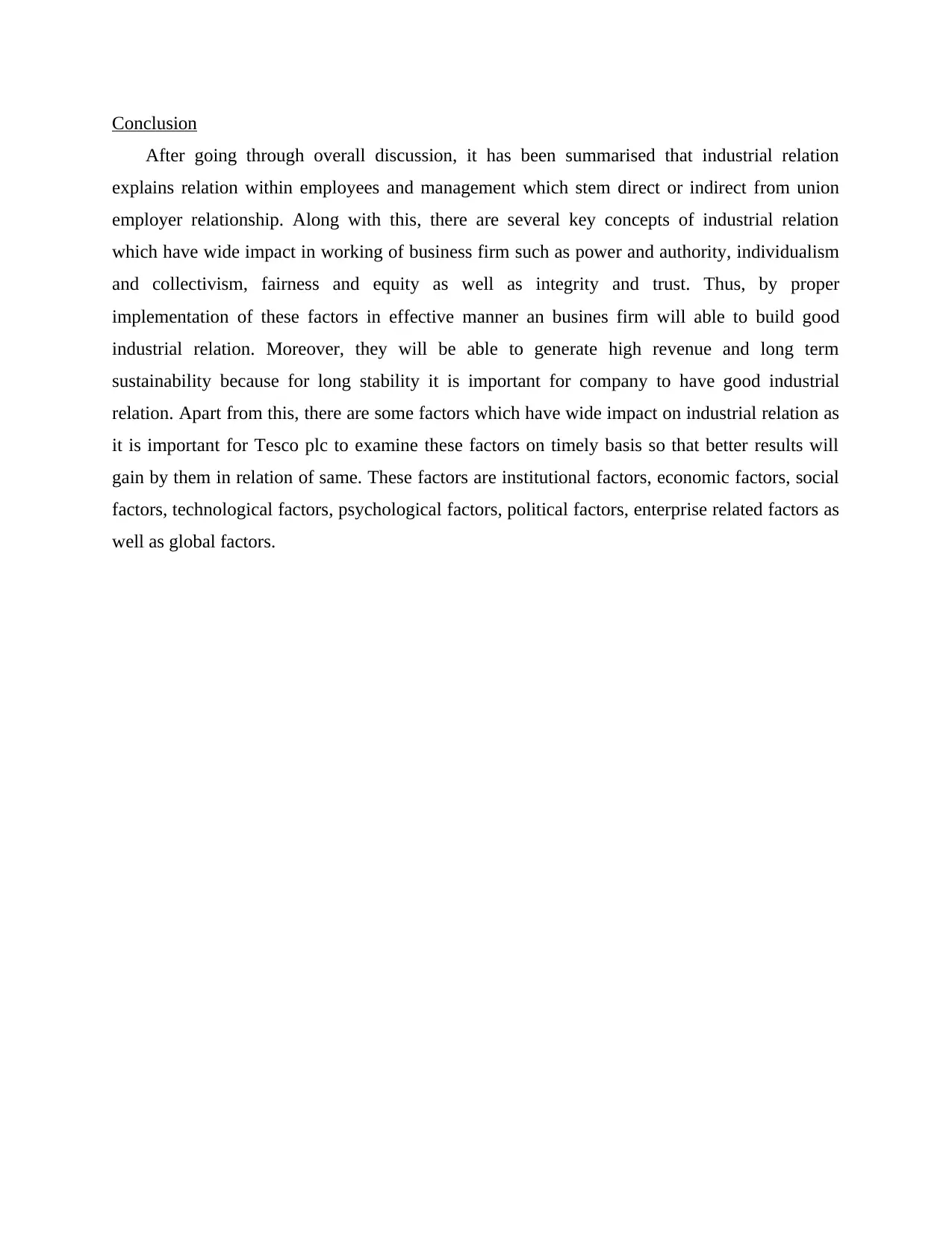
Conclusion
After going through overall discussion, it has been summarised that industrial relation
explains relation within employees and management which stem direct or indirect from union
employer relationship. Along with this, there are several key concepts of industrial relation
which have wide impact in working of business firm such as power and authority, individualism
and collectivism, fairness and equity as well as integrity and trust. Thus, by proper
implementation of these factors in effective manner an busines firm will able to build good
industrial relation. Moreover, they will be able to generate high revenue and long term
sustainability because for long stability it is important for company to have good industrial
relation. Apart from this, there are some factors which have wide impact on industrial relation as
it is important for Tesco plc to examine these factors on timely basis so that better results will
gain by them in relation of same. These factors are institutional factors, economic factors, social
factors, technological factors, psychological factors, political factors, enterprise related factors as
well as global factors.
After going through overall discussion, it has been summarised that industrial relation
explains relation within employees and management which stem direct or indirect from union
employer relationship. Along with this, there are several key concepts of industrial relation
which have wide impact in working of business firm such as power and authority, individualism
and collectivism, fairness and equity as well as integrity and trust. Thus, by proper
implementation of these factors in effective manner an busines firm will able to build good
industrial relation. Moreover, they will be able to generate high revenue and long term
sustainability because for long stability it is important for company to have good industrial
relation. Apart from this, there are some factors which have wide impact on industrial relation as
it is important for Tesco plc to examine these factors on timely basis so that better results will
gain by them in relation of same. These factors are institutional factors, economic factors, social
factors, technological factors, psychological factors, political factors, enterprise related factors as
well as global factors.
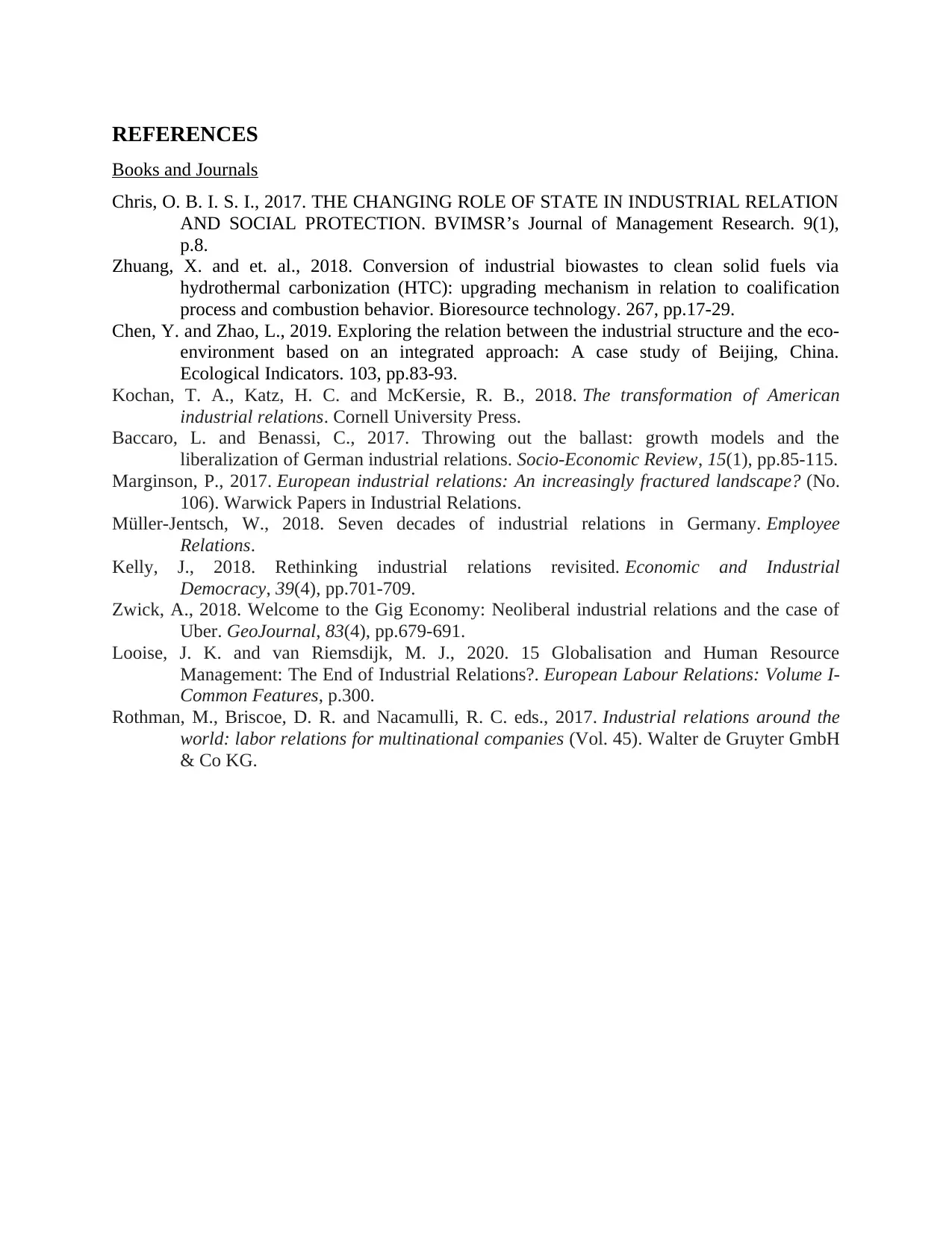
REFERENCES
Books and Journals
Chris, O. B. I. S. I., 2017. THE CHANGING ROLE OF STATE IN INDUSTRIAL RELATION
AND SOCIAL PROTECTION. BVIMSR’s Journal of Management Research. 9(1),
p.8.
Zhuang, X. and et. al., 2018. Conversion of industrial biowastes to clean solid fuels via
hydrothermal carbonization (HTC): upgrading mechanism in relation to coalification
process and combustion behavior. Bioresource technology. 267, pp.17-29.
Chen, Y. and Zhao, L., 2019. Exploring the relation between the industrial structure and the eco-
environment based on an integrated approach: A case study of Beijing, China.
Ecological Indicators. 103, pp.83-93.
Kochan, T. A., Katz, H. C. and McKersie, R. B., 2018. The transformation of American
industrial relations. Cornell University Press.
Baccaro, L. and Benassi, C., 2017. Throwing out the ballast: growth models and the
liberalization of German industrial relations. Socio-Economic Review, 15(1), pp.85-115.
Marginson, P., 2017. European industrial relations: An increasingly fractured landscape? (No.
106). Warwick Papers in Industrial Relations.
Müller-Jentsch, W., 2018. Seven decades of industrial relations in Germany. Employee
Relations.
Kelly, J., 2018. Rethinking industrial relations revisited. Economic and Industrial
Democracy, 39(4), pp.701-709.
Zwick, A., 2018. Welcome to the Gig Economy: Neoliberal industrial relations and the case of
Uber. GeoJournal, 83(4), pp.679-691.
Looise, J. K. and van Riemsdijk, M. J., 2020. 15 Globalisation and Human Resource
Management: The End of Industrial Relations?. European Labour Relations: Volume I-
Common Features, p.300.
Rothman, M., Briscoe, D. R. and Nacamulli, R. C. eds., 2017. Industrial relations around the
world: labor relations for multinational companies (Vol. 45). Walter de Gruyter GmbH
& Co KG.
Books and Journals
Chris, O. B. I. S. I., 2017. THE CHANGING ROLE OF STATE IN INDUSTRIAL RELATION
AND SOCIAL PROTECTION. BVIMSR’s Journal of Management Research. 9(1),
p.8.
Zhuang, X. and et. al., 2018. Conversion of industrial biowastes to clean solid fuels via
hydrothermal carbonization (HTC): upgrading mechanism in relation to coalification
process and combustion behavior. Bioresource technology. 267, pp.17-29.
Chen, Y. and Zhao, L., 2019. Exploring the relation between the industrial structure and the eco-
environment based on an integrated approach: A case study of Beijing, China.
Ecological Indicators. 103, pp.83-93.
Kochan, T. A., Katz, H. C. and McKersie, R. B., 2018. The transformation of American
industrial relations. Cornell University Press.
Baccaro, L. and Benassi, C., 2017. Throwing out the ballast: growth models and the
liberalization of German industrial relations. Socio-Economic Review, 15(1), pp.85-115.
Marginson, P., 2017. European industrial relations: An increasingly fractured landscape? (No.
106). Warwick Papers in Industrial Relations.
Müller-Jentsch, W., 2018. Seven decades of industrial relations in Germany. Employee
Relations.
Kelly, J., 2018. Rethinking industrial relations revisited. Economic and Industrial
Democracy, 39(4), pp.701-709.
Zwick, A., 2018. Welcome to the Gig Economy: Neoliberal industrial relations and the case of
Uber. GeoJournal, 83(4), pp.679-691.
Looise, J. K. and van Riemsdijk, M. J., 2020. 15 Globalisation and Human Resource
Management: The End of Industrial Relations?. European Labour Relations: Volume I-
Common Features, p.300.
Rothman, M., Briscoe, D. R. and Nacamulli, R. C. eds., 2017. Industrial relations around the
world: labor relations for multinational companies (Vol. 45). Walter de Gruyter GmbH
& Co KG.
⊘ This is a preview!⊘
Do you want full access?
Subscribe today to unlock all pages.

Trusted by 1+ million students worldwide
1 out of 23
Related Documents
Your All-in-One AI-Powered Toolkit for Academic Success.
+13062052269
info@desklib.com
Available 24*7 on WhatsApp / Email
![[object Object]](/_next/static/media/star-bottom.7253800d.svg)
Unlock your academic potential
Copyright © 2020–2026 A2Z Services. All Rights Reserved. Developed and managed by ZUCOL.





